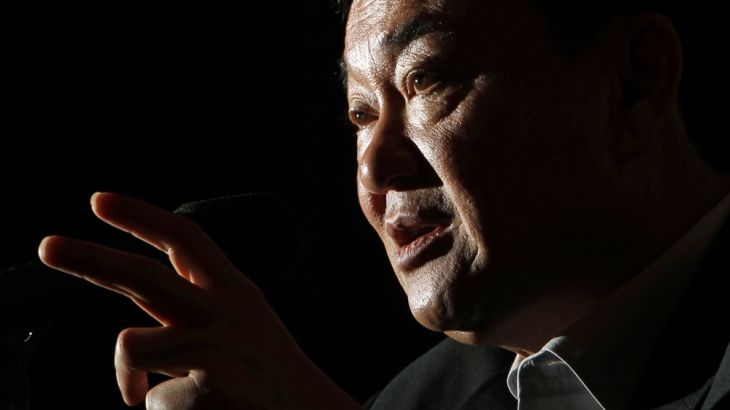
Thaksin Shinawatra: Let Thailand return to democracy
The former Thai PM speaks about military rule, his self-imposed exile, and the challenges facing the country.
Despite living in self-imposed exile for the best part of 10 years, Thailand’s former prime minister, Thaksin Shinawatra, continues to shape and influence Thai politics.
”If
really love the people and the country as they claim, they should let it return to a democracy.”]
Keep reading
list of 4 itemsUS House approves aid package worth billions for Ukraine, Israel
Will India’s election be free and fair?
Togo approves constitutional reform changing how president is elected
Elected to power in 2001, he was the first democratically elected prime minister to serve a full term in office before being re-elected in a 2005 landslide victory.
A former telecommunications billionaire, the business tycoon-turned-politician drew his support from Thailand’s rural poor, with his populist healthcare programmes and assistance for farmers schemes, winning him great levels of support.
However, loathed by the elite who saw him as a threat to the monarchy, Thaksin would face increasing allegations of corruption, with attention soon turning towards his tremendous wealth.
Coupled with accusations that he insulted the revered monarchy, protests would pave the way for the military to launch a bloodless coup in September 2006 while he was in the US.
Apart from a brief return to Thailand in 2008, Thaksin has based himself in self-imposed exile in Dubai, the United Arab Emirates, ever since.
He has since been found guilty by Thai courts of abusing his power over a land deal while also being stripped of around $1.4bn for concealing ownership of shares in a telecommunications company and for amending government policies to benefit it.
Thaksin told Al Jazeera that fears over his safety were stopping him from returning to the country.
“If I was there, who could guarantee my safety?” he asked. When asked if his life was in danger, Thaksin replied: “Definitely”, pausing before adding that while he was prime minister, there were 14 attempts on his life, including a 2006 foiled car-bomb assassination near his residence.
Thaksin’s younger sister, Yingluck Shinawatra, would later become the country’s first female prime minister in 2011, but when her government tried to push through a bill that would have granted amnesty to those found guilty of political crimes, protests gripped the country.
Yingluck was removed from office in a coup in May 2014 when a military government, headed by General Prayuth Chan-ocha, came to power.
With the military continuing to run the country under the so-called National Council for Peace and Order, elections have repeatedly been delayed with rights groups accusing the military government of trying to solidify its hold on power.
“The draft constitution is [a] bad constitution; I don’t even know if we can compare [it] to North Korea,” Thaksin said.
In this episode of Talk to Al Jazeera, Thaksin Shinawatra, who has largely remained silent since the coup forced him from office, talks to Wayne Hay about the challenges facing the country and what lies ahead.